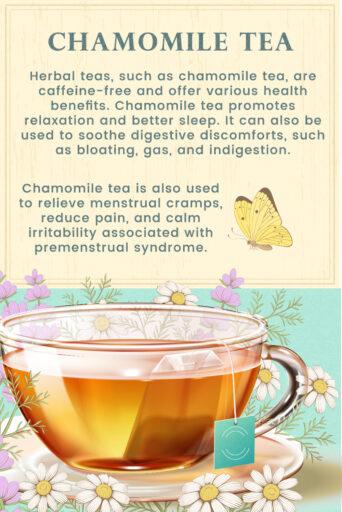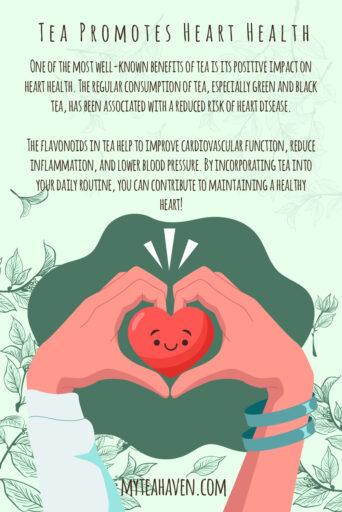Sip Your Way to Wellness: Unveiling the Incredible Benefits of Tea
Tea Benefits
There is absolutely nothing like starting my day with a warm cup of tea. It’s always comforting and gives me the strength to tackle a day’s challenges head on. However, there is more to tea than its calming properties and the wonderful aromatic experience it provides. It also offers numerous health benefits that make it a delightful addition to a healthy lifestyle. Today I am going to share with you the incredible health benefits of tea and why it can aid in your journey to becoming the best and healthiest you that you can possibly be.
We are a participant in the Amazon Services LLC Associates Program, an affiliate advertising program designed to provide a means for us to earn fees by linking to Amazon.com and related sites. This post may contain affiliate links which means we may receive a commission, at no cost to you, for purchases made using our links. Please see my disclosure to learn more. Unless otherwise stated, all prices are in US$.

The Good Living Guide to Medicinal Tea
50 Ways to Brew the Cure for What Ails You
More than just a warm and comforting drink, tea has medicinal properties that are widely underused in North America. Common herbs, spices, fruits, and barks have been scientifically proven to help relieve pain, menopause symptoms, high blood pressure, insomnia, stress, and digestive angst.
The Health Benefits of Tea
It Boosts the Immune System

Tea can be a powerful tool in strengthening your immune system. Packed with antioxidants, vitamins, and minerals, tea helps your body fight off infections and supports a healthy immune response.
The polyphenols found in tea have been shown to have antimicrobial and antiviral properties. This can help protect you and your loved ones against common illnesses.
It Promotes Heart Health
One of the most well-known benefits of tea is its positive impact on heart health. The regular consumption of tea, especially green and black tea, has been associated with a reduced risk of heart disease.
The flavonoids in tea help to improve cardiovascular function, reduce inflammation, and lower blood pressure. By incorporating tea into your daily routine, you can contribute to maintaining a healthy heart!

It Enhances Brain Function

Tea is not just refreshing for your taste buds; it’s also beneficial for your brain. The combination of caffeine and L-theanine found in tea can improve cognitive function, enhance focus, and promote mental alertness.
The natural compounds in tea have been linked to a lower risk of neurodegenerative diseases, such as Alzheimer’s and Parkinson’s. This makes tea a very smart choice for your overall brain health!
It Supports Weight Management
If you are looking to shed a few pounds or maintain a healthy weight, tea can be an excellent companion in your journey. Certain types of tea (such as green tea) have been found to boost metabolism and increase fat oxidation.
Additionally, tea can help control appetite and cravings. This makes it much easier to adhere to a balanced diet and achieve your weight management goals.

It Helps With Digestion
Herbal teas have been used to soothe digestive discomfort and promote healthy digestion for centuries. For example, peppermint tea can relieve bloating and indigestion, while ginger tea can calm an upset stomach.

The natural compounds in tea have gentle and beneficial effects on the digestive system. This means that tea is a perfect natural remedy for various digestive issues.
Types of Tea and Their Benefits
Green Tea
Green tea is well-known for its powerful antioxidant properties. It contains catechins, which are potent antioxidants that help protect cells from damage and reduce the risk of chronic diseases. Regular consumption of green tea has been linked to a lower risk of cancer, improved brain function, and weight management.

Oolong Tea
Oolong tea combines the qualities of green and black tea, offering a unique taste and a range of health benefits. It has been associated with weight management, improved skin health, and reduced risk of heart disease.

Black Tea
Black tea is known for its rich flavor and robust taste, but it also offers a range of health benefits. It contains theaflavins and thearubigins, which have antioxidant properties and can help reduce cholesterol levels. Black tea has also been associated with improved gut health and a decreased risk of stroke.
White Tea
White tea is the least processed tea variety, retaining high levels of antioxidants. It has a delicate flavor and offers potential benefits such as improving skin health, promoting oral health, and supporting cardiovascular health.
Herbal Tea
Herbal teas, such as chamomile, peppermint, and hibiscus, are caffeine-free and offer various health benefits. Chamomile tea promotes relaxation and better sleep, while peppermint tea aids digestion and soothes headaches. Hibiscus tea is rich in antioxidants and may help lower blood pressure.

Antioxidants in Tea
The Role of Antioxidants
Antioxidants are crucial for protecting our bodies against oxidative stress and damage caused by harmful free radicals. They help neutralize these free radicals, reducing the risk of chronic diseases such as cancer, heart disease, and aging-related conditions.
Tea as a Rich Source of Antioxidants
Tea, particularly green tea, is renowned for its high antioxidant content. Epigallocatechin gallate (EGCG) is a potent antioxidant found in green tea and has been extensively studied for its potential health benefits. By regularly consuming tea, you can increase your intake of antioxidants and promote a healthier body!
Caffeine in Tea

Moderate Caffeine Content
Unlike coffee, tea only contains a moderate amount of caffeine. This means tea provides a gentle and sustained energy boost without any potential jitters or crashes down the road.
The caffeine in tea is balanced by the presence of L-theanine, an amino acid that promotes relaxation and reduces anxiety.
The Health Benefits of Caffeine
Caffeine offers several health benefits when consumed in moderation. It can improve focus, enhance physical performance, and boost metabolism. Additionally, caffeine has been linked to a reduced risk of certain diseases, such as type 2 diabetes and liver disease.
Tips for Brewing the Perfect Cup of Tea
Choosing the Right Tea Leaves
To brew a delicious cup of tea, start with high-quality tea leaves.
Choose loose-leaf teas or tea bags that contain whole tea leaves if you can. These provide the best flavor and aroma.

Water Temperature and Steeping Time
Different types of tea require specific water temperatures and steeping times to bring out their optimal flavors.
Green and white teas are best brewed with water around 175°F (80°C). Black and herbal teas typically require boiling water. Follow the instructions provided with your tea or experiment to find your perfect brew!
Enhancing the Flavor
To enhance the flavor of your tea, consider adding natural sweeteners like honey or a splash of citrus juice. Experiment with fresh herbs, spices, or even fruit slices to create unique flavor combinations.
A Few Final Thoughts

Tea is not just a beverage. It’s a journey filled with flavors, aromas, and incredible health benefits.
By incorporating tea into your daily routine, you can boost your immune system, support heart health, enhance brain function, manage weight, and aid digestion. All while enjoying the richness of antioxidants and moderate caffeine content!
So go ahead, savor a cup of tea and experience the wonders it can bring to your well-being!

Healing Herbal Teas
Learn to Blend 101 Specially Formulated Teas
Freshly blended herbal teas offer more healing power than pre-packaged tea bags. In Healing Herbal Teas, master herbalist and author Sarah Farr serves up 101 original recipes that not only offer health advantages but also taste great. Formulations to benefit each body system and promote well-being include Daily Adrenal Support, Inflammation Reduction, and Digestive Tonic.
Some Questions You Might Have
- Is tea a healthier choice than coffee?
While both tea and coffee offer their own unique health benefits, tea is often considered a healthier choice due to its high antioxidant content, lower caffeine levels, and potential positive effects on heart health.
- How many cups of tea should I drink per day?
The recommended daily intake of tea varies, but consuming 2 to 3 cups a day is generally considered a moderate and beneficial amount. However, it’s always best to listen to your body and adjust your tea consumption based on how it makes you feel.
- Can tea help with weight loss?
Certain types of tea (such as green tea) have been associated with weight management due to their metabolism-boosting and fat oxidation properties. However, it’s important to remember that tea is a wonder but it isn’t a miracle beverage. It should still be complemented by a healthy diet and regular exercise for effective weight loss.
- Are herbal teas safe for children?
Herbal teas are generally safe for children when consumed in moderation. However, it’s best to consult with a healthcare professional or pediatrician before introducing herbal teas to young children to ensure they are appropriate and safe.
- Can I drink tea before bedtime?
The caffeine content in tea can vary depending on the type and brewing time. If you’re sensitive to caffeine, it’s advisable to avoid drinking tea close to bedtime or go for caffeine-free herbal teas, such as chamomile or peppermint, which promote relaxation and better sleep.
Please keep in mind that the information presented here is not meant to serve as medical advice. This article is only meant to provide general information. Always consult your doctor before making any health-related decisions.









Comments are closed.